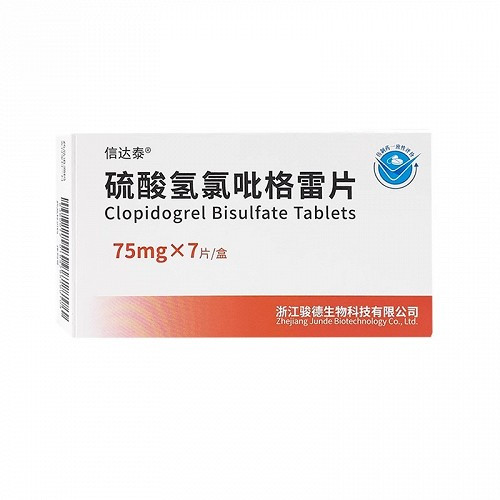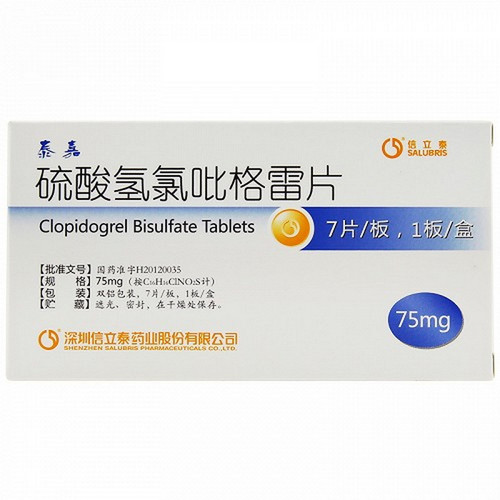Product Overview
[Drug Name]
Generic Name: Clopidogrel Hydrogen Sulfate Tablets
Trade Name: Shuaixin
English Name: Clopidogrel Hydrogen Sulfate Tablets
Chinese Pinyin: Clopidogrel Hydrogen Sulfate Tablets
[Ingredients]
The main ingredient of this product is clopidogrel sulfate. Chemical name: S(+)-2-(2-chlorophenyl)-2-(4,5,6,7-tetrahydrothiophen[3,2-c]pyridin-5-yl)acetate methyl hydrogen sulfate
[Properties]
This product is a white or off-white tablet or film-coated tablet. After removing the coating, it appears white or off-white.
[Indications]
Clopidogrel is used to prevent atherothrombotic events in the following patients: patients with myocardial infarction (from a few days to less than 35 days), patients with ischemic stroke (from 7 days to less than 8 months), or patients with established peripheral arterial disease. Acute Coronary Syndrome: For patients with non-ST-segment elevation acute coronary syndrome (including unstable angina or non-Q-wave myocardial infarction), including those with stent implantation after percutaneous coronary intervention, in combination with aspirin. For patients with ST-segment elevation acute coronary syndrome, in combination with aspirin, it can be used in conjunction with thrombolytic therapy.
[Dosage and Administration]
Oral administration, may be taken with or without food. Two tablets once daily.
[Adverse Reactions]
Occasional gastrointestinal reactions (such as abdominal pain, indigestion, constipation, or diarrhea), rash, and mucocutaneous bleeding may occur. Rarely, leukopenia and granulocytopenia may occur.
[Contraindications]
1. This product is contraindicated in patients with hypersensitivity to the active substance or any of its components, severe liver damage, or active pathological bleeding such as peptic ulcer or intracranial hemorrhage.
2. This product is contraindicated in breastfeeding women.
[Precautions]
1. Due to the risk of bleeding and hematologic adverse reactions, if clinical symptoms of bleeding occur during treatment, a blood count and/or other appropriate tests should be immediately considered. 2. As with other antiplatelet drugs, clopidogrel should be used with caution in patients at increased risk of bleeding due to trauma, surgery, or other pathological conditions, and in patients receiving aspirin, nonsteroidal anti-inflammatory drugs, heparin, platelet glycoprotein IIb/IIIa (GP IIb/IIIa) antagonists, or thrombolytics. Patients should be closely followed for any signs of bleeding, including occult bleeding, particularly during the initial weeks of treatment and after cardiac intervention or surgery. The concomitant use of clopidogrel with warfarin is not recommended due to the potential for exacerbating bleeding (see [Drug Interactions]). 3. In patients undergoing elective surgery, if antiplatelet therapy is not necessary, clopidogrel should be discontinued for at least 7 days before surgery. Clopidogrel prolongs bleeding time and should be used with caution in patients with bleeding disorders (particularly gastrointestinal and intraocular diseases).
[Use in Special Populations]
Precautions for Children:
The safety and efficacy of this product in pediatric use have not been established.
Precautions for Pregnancy and Lactation:
This product is contraindicated in breastfeeding women.
Precautions for Elderly:
The plasma concentration of the main metabolite in elderly individuals (aged 75 and above) is significantly higher than that in young healthy volunteers. However, the higher plasma concentration is not associated with differences in platelet aggregation or bleeding time, so dose adjustment is not necessary for the elderly.
[Drug Interactions]
Aspirin: This product enhances the inhibitory effect of aspirin on collagen-induced platelet aggregation. Further research is lacking regarding the safety of long-term coadministration. Heparin: Studies in healthy volunteers have shown no interaction between this product and heparin. However, caution should be exercised when coadministering these drugs. Nonsteroidal Anti-inflammatory Drugs (NSAIDs): Concomitant use of this product and naproxen in healthy volunteers has increased gastrointestinal occult blood loss. Therefore, caution should be exercised when coadministering this product with NSAIDs. Warfarin: No safety studies have been conducted regarding coadministration.
[Pharmacological Action]
This product is a platelet aggregation inhibitor that selectively inhibits the binding of ADP to platelet receptors, subsequently inhibiting the activation of the ADP-glycoprotein GPIIb/IIIa complex, thereby inhibiting platelet aggregation. This product also inhibits platelet aggregation induced by non-ADP pathways without affecting phosphodiesterase activity. This product irreversibly alters platelet ADP receptors, thereby affecting platelet lifespan.
[Storage] Protect from light and store in a sealed container.
[Strength] 75 mg (as C₁₆H₁₆ClNO₂S)
[Packaging Size] 75 mg x 14 tablets
[Expiry Life] 36 months
[Approval Number] National Medical Standard H20123116
[Manufacturer] Company Name: Lepu Pharmaceutical Co., Ltd.








